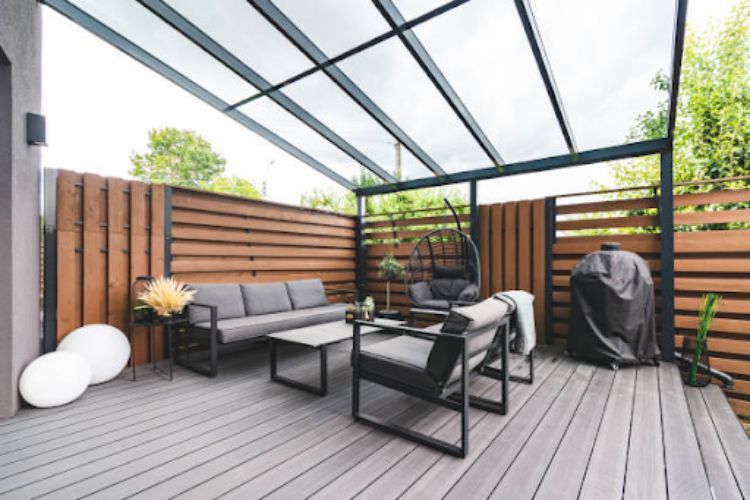 Rooftop decks in Boston, Massachusetts, offer a unique opportunity to create an inviting outdoor living space. However, considering the challenges posed by Boston’s climate, selecting suitable materials for rooftop decking is crucial.
Rooftop decks in Boston, Massachusetts, offer a unique opportunity to create an inviting outdoor living space. However, considering the challenges posed by Boston’s climate, selecting suitable materials for rooftop decking is crucial.
This article aims to explore the top materials suitable for rooftop decking in Boston, providing valuable insights for homeowners and contractors alike.
Factors to Consider When Choosing Materials
When selecting the materials for your rooftop deck in Boston, Massachusetts, there are several factors to consider. Here are some of the factors that should be kept in mind:
1. Climate Considerations: Boston experiences temperature variations, moisture levels, and exposure to sunlight. The chosen materials should withstand these conditions without warping, fading, or deteriorating. Boston’s icy winters and hot summers require materials that can handle these fluctuations effectively.
2. Durability and Resistance to Weather Elements: Rooftop decks are exposed to snow, rain, and wind. Opt for materials that can withstand these elements to prevent water damage, rot, or structural issues. The materials should be able to resist moisture and prevent the growth of mold or mildew.
3. Weight Limitations and Structural Requirements: Rooftop decks have weight limitations determined by the building’s structure. Ensure the selected materials are lightweight enough to meet these requirements without compromising safety. Additionally, consider the structural conditions and consult with a professional to ensure that the roof can support the weight of the chosen materials.
4. Maintenance Requirements and Longevity: Consider the materials’ long-term maintenance needs and lifespan. Durable and low-maintenance options can save time and money in the future. Materials that require minimal staining, sealing, or painting will reduce the overall maintenance effort.
Top Materials for Rooftop Decking in Boston
When building a rooftop deck in Boston, choosing suitable materials is essential for creating a beautiful and functional outdoor space that can withstand the unique challenges of the local climate. Here are some top materials to consider for your rooftop decking project:
Pressure Treated Wood:
Pressure-treated wood is a popular choice as a roof decking material due to its affordability and availability. It is treated to resist rot and insect damage, making it durable. However, pressure-treated wood does require regular maintenance, including staining and sealing, to protect it from water damage and ensure its longevity. Choosing pressure-treated wood from sustainable sources is essential to minimize environmental impact.
Composite Decking:
Composite decking is made from a blend of wood fibers and recycled plastic. It offers a balance between durability and low maintenance. Composite decking is resistant to rot, fading, and staining, making it ideal for Boston’s climate. While it may have a higher initial cost than other materials, composite decking provides long-term savings as it requires minimal maintenance. Various reputable brands, such as Trex, Fiberon, and TimberTech, offer a wide range of colors and finishes to suit different design preferences.
PVC Decking:
PVC decking is 100% plastic, offering exceptional durability and resistance to moisture, mold, and fading. It requires minimal upkeep, eliminating the need for staining or sealing. PVC decking is available in various colors and textures, providing homeowners with flexibility in design. It is a suitable option for those seeking a long-lasting, hassle-free solution for their rooftop deck.
Rooftop Tiles and Pavers:
Rooftop tiles and pavers are versatile and easy to install, offering numerous deck design ideas for rooftop decks. They come in different materials, such as concrete, porcelain, or rubber, and provide various colors, patterns, and finishes. Rooftop tiles and pavers offer excellent drainage, preventing water accumulation and protecting the roof. Proper installation is crucial to ensure they are compatible with the existing roof structure and can handle the weight distribution.
Aluminum Decking:
Aluminum decking is a durable and lightweight option for rooftop decks. It is resistant to moisture, decay, and insect damage, making it suitable for Boston’s climate. Aluminum decking requires specialized tools for installation, and it may have a higher initial cost than other materials. However, its longevity and low maintenance needs make it a worthwhile investment.
By carefully considering these materials and their suitability for Boston’s climate, you can choose the best option for your rooftop deck project. Consult with a local building professional or Boston roofing contractor to ensure the materials comply with local building codes and regulations.
Comparison of Materials
When choosing the suitable material for your rooftop decking in Boston, it’s essential to consider several factors to ensure a successful and long-lasting outdoor space. Here, we delve into a detailed comparison of different materials, considering cost considerations, environmental impact, aesthetics and design options, maintenance requirements, and suitability for Boston’s climate.
A. Cost considerations:
- Upfront expenses: The initial cost of materials and installation should be considered when choosing suitable rooftop decking material options. Materials like pressure-treated wood or composite decking may cost less upfront than premium options like hardwood or porcelain pavers.
- Long-term savings and return on investment: Consider the durability and longevity of the materials. While premium options may have higher upfront costs, they are durable and requires less maintenance, resulting in potential long-term savings. Also, choosing a material that adds value to your property can provide a favorable return on investment.
B. Environmental impact
- Sustainability: If environmental sustainability is a priority, consider materials sourced from sustainable forests or eco-friendly manufacturing processes. FSC-certified wood, recycled plastic composite, or reclaimed materials are some options.
- Recyclability: Materials that can be recycled at the end of their lifespan contribute to a more sustainable approach. Look for materials that can be repurposed or recycled, reducing waste and minimizing environmental impact.
C. Aesthetics and design options:
- Colors: Different materials offer a range of colors to choose from, allowing you to match your rooftop deck with your desired aesthetic and existing design elements it is advisable to choose lighter colors.
- Finishes: Consider the texture and finish options available with each material. From natural wood grain to smooth surfaces, the right finish can enhance the overall look of your rooftop deck.
- Customization Possibilities: Some materials offer flexibility in design, allowing for unique patterns, shapes, and configurations. Explore materials that provide customization options to create a truly personalized rooftop deck.
D. Maintenance requirements:
- Cleaning: Consider the ease of cleaning and maintaining the material. Some materials require regular cleaning with mild detergents, while others require specific cleaning solutions or methods.
- Sealing: Some materials, such as wood, may require periodic sealing to protect against moisture and UV damage. Others, like composite decking, may require minimal maintenance and no sealing.
- Potential Repairs: Evaluate the potential for repairs and replacements. While some materials may be more prone to damage and require occasional maintenance, others offer better resistance and longevity.
Conclusion
When selecting materials for rooftop decking in Boston, Massachusetts, homeowners and contractors should carefully consider climate factors, durability, weight limitations, maintenance requirements, and budget. Pressure-treated wood, composite decking, PVC decking, rooftop tiles/pavers, and aluminum decking are all viable options. Consulting with a Boston roofing contractor is essential to ensure the chosen materials align with local building codes and structural requirements. Also, lighter colors can help stay more relaxed in the summer heat. With suitable materials and design choices, homeowners can create a stunning rooftop deck that enhances their outdoor living experience for years.




